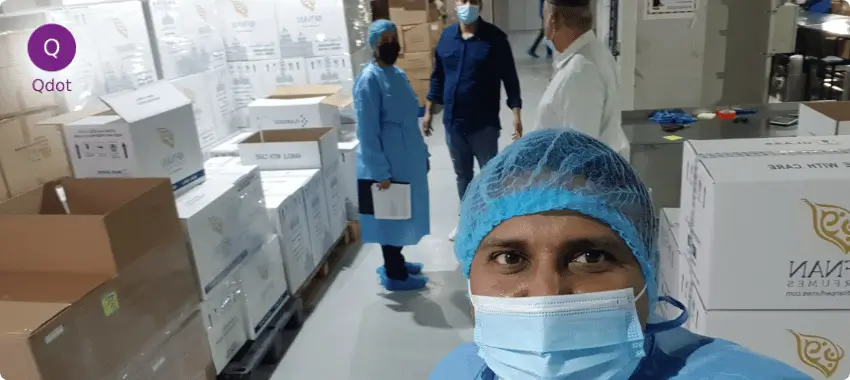
Halal Certification in the UAE is vital because the majority of the population is Muslim, and the nation operates under Islamic law (Shariah). The UAE’s economy primarily focuses on food and beverage manufacturing, but it also includes other industries such as pharmaceuticals, packaged foods, cosmetics, beverages, and snacks.
What is Halal Certification?
Halal Certification guarantees that food products, handling methods, storage, packaging, and processing procedures comply with Halal requirements. This certification is essential for Muslim consumers who follow the Halal diet and seek assurance that products they consume or use are free from prohibited (haram) ingredients.
Organizations must ensure that Halal products are free from non-Halal substances or materials derived from prohibited or harmful sources. The Quran explicitly prohibits pork and its by-products, making compliance with Halal principles a religious necessity.
Halal Certification builds trust and credibility by assuring consumers that the products have undergone thorough inspection and comply with Islamic dietary laws.
Why IS HALAL Certification In UAE Important For Your Business?
Halal Certification in the UAE is not only about compliance.it is also a strategic business advantage. Companies operating in the UAE can access international markets, build consumer confidence, and align with Islamic values.
- More Business Opportunities:
- Religious Compliance:
- Consumer Confidence:
- Market Access:
- Tourism and Hospitality Attraction:
- International Recognition:
Organizations gain opportunities to trade locally and internationally with countries that follow specific Halal product laws.
It ensures that products consumed by Muslims in the UAE align with their beliefs and demonstrates the country’s commitment to providing Halal options.
A certified Halal logo on products helps Muslim consumers easily identify items that meet their dietary standards, increasing brand trust.
Halal Certification provides access to both domestic and global markets, including Muslim-majority countries across the GCC, Asia, and Africa.
Dubai and other Emirates attract millions of Muslim tourists. Halal-certified companies, especially in the food and hospitality industries, appeal strongly to these visitors.
As a global trade hub, the UAE promotes Halal-certified products worldwide, offering greater export potential for certified businesses.
How Qdot Supports You in Halal Certification
Qdot provides comprehensive consultancy services designed to simplify your Halal Certification journey across the United Arab Emirates. Our team of experienced consultants ensures that your business in Dubai, Abu Dhabi, Sharjah, Ajman, Fujairah, Ras Al Khaimah, or Umm Al Quwain meets every compliance requirement efficiently.
Our support includes:
- Conducting gap analysis to identify compliance gaps within existing systems.
- Assisting in documentation and process development aligned with UAE Halal standards.
- Offering employee training on Halal principles, hygiene, and quality control.
- Coordinating with accredited certification bodies recognized by ESMA and EIAC.
- Providing ongoing post-certification and renewal support to maintain compliance.
Key Benefits Of Having HALAL Certification
Halal Certification offers several business benefits:
- Builds Consumer Trust: Muslim customers can confidently choose Halal-certified products that meet Islamic dietary and hygiene standards.
- Promotes Health and Cleanliness: Certification ensures that food and beverage products meet high hygiene and safety standards.
- Expands Customer Base: Both Muslim and non-Muslim consumers associate Halal food with quality and purity.
- Facilitates Global Trade: Halal Certification acts as a passport for international business expansion.
What is the Cost of Halal Certification in UAE?
The cost of obtaining Halal Certification in the UAE depends on several factors, including the size of the business, type of product, scope of certification, and the selected certification body.
Typical expenses include:
- Application and documentation review fees
- Audit and inspection fees
- Certificate issuance fees
Start Your Halal Certification Journey in the UAE
Halal Certification in the UAE goes beyond compliance. it’s a symbol of trust, quality, and business growth. For organizations across the Emirates, achieving this certification builds credibility, ensures regulatory alignment, and strengthens customer confidence.
Whether your operations are based in Dubai, Abu Dhabi, Sharjah, Ajman, Fujairah, Ras Al Khaimah, or Umm Al Quwain, Qdot provides step-by-step support to make your Halal Certification process seamless and successful.
contact us at: Call / WhatsApp: +971 56 502 1526 or +971 800 QDOT9 (73689) or Email: info@qdot.ae to start your certification journey
FAQ's
Halal Certification verifies that products and processes comply with Islamic dietary laws under Shariah principles.
All food, beverage, cosmetic, and pharmaceutical companies serving Muslim consumers require Halal Certification.
The process generally takes 30–60 days, depending on product scope and document readiness.
The cost depends on business size, number of products, and certification body requirements in the UAE.
ESMA and EIAC are the key authorities authorized to issue and oversee Halal Certificates.
Halal Certificates are valid for one to three years, depending on the certifying body and renewal requirements.
Yes, Qdot provides complete support with documentation, implementation, and audit preparation for Halal compliance.
Yes, exporting to Muslim-majority countries requires Halal Certification for product acceptance and clearance.
Yes, Qdot offers staff training to ensure ongoing Halal compliance and awareness of certification requirements.
Renewal audits are conducted to maintain a valid Halal Certification and continuous compliance with UAE standards.
